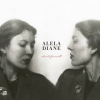Liverpool Sound and Vision Rating 7/10
The name and music of Alela Diane might be lost on the vast majority of people in the U.K., in the same way that some of these isles more eclectic and diverse musicians might be mislaid or even missing from the American subconscious. It doesn’t mean they should be dismissed, it just means that the ocean that divides a common tongue is sometimes just that little too wide, too expansive for a great ship to traverse.
Alela Diane though should appeal to a certain section of music lovers in the U.K., the story-telling acoustic set who appreciate a song that comes from the heart as well as the head, the ones that can spot a real tune of intricate beauty instead of being fed in a style that is reminiscent of mass produced pulp that is thrown together on certain television shows on both sides of the Atlantic. Her latest album, About Farewell, is just that, a flower ready to bloom in the warm spring, valued for its exquisiteness, cherished for its attraction but something that also will benefit for its prolonged exposure in the light of day and not squirreled away; an album that is to be enjoyed by one and all and not just in the arms of a few.
There is intensity and a longing of epic female proportions that is almost uncontainable throughout the album, a symbol and introspection of the words that flowed from the likes of Lucille Clifton, Anne Sexton or Maxine Kumin, great female poets that stand against time and a certain destructive force. For Alela Diane, her music is no less complex and enjoyable on songs such as the opener Colorado Blue, the loneliness that emanates from the quietness of The Way We Fall and I Thought I Knew and the truthful realisation of Black Sheep that makes the listener, no matter the genre they are used to, want to hold it away from the world and its hurt and nourish the blooming flower.
An album that deals in the artist’s feelings, especially when the pain of the past catches up with them can be too much for some, they will turn away, leaving the flower to fend for itself but when a human being is throwing their life open, no matter how quiet the sound, the roar is there to be heard.
Ian D. Hall
